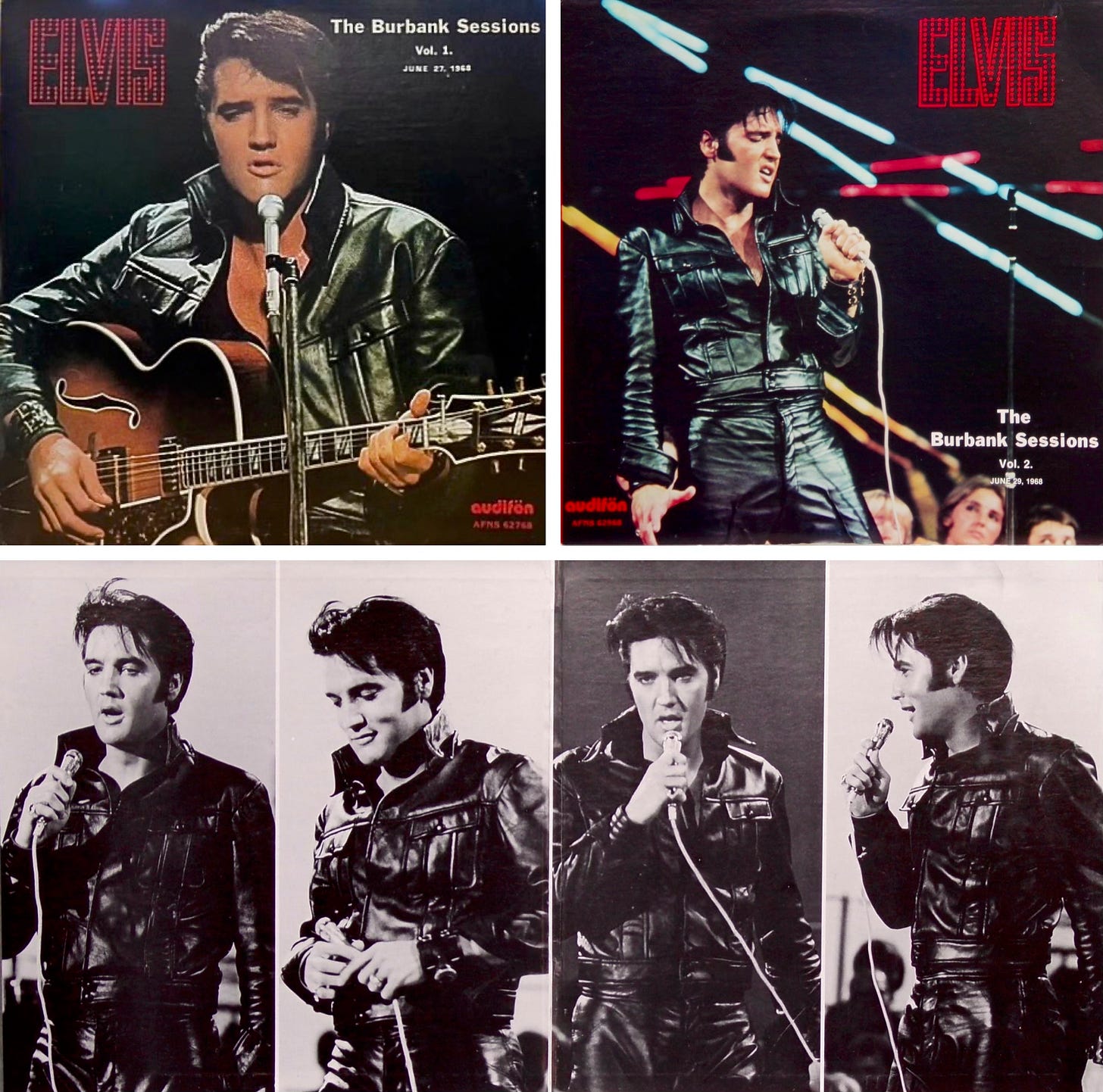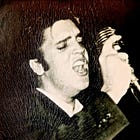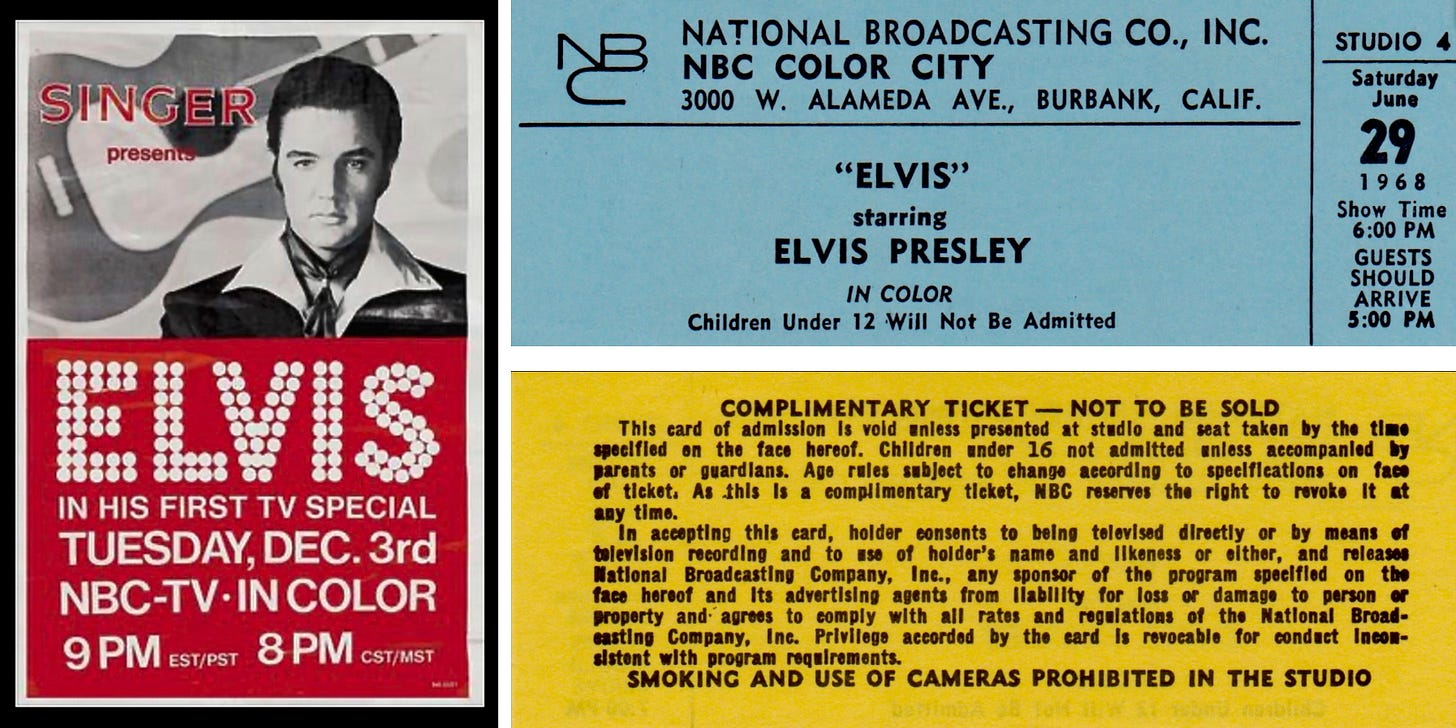The Pirated Comeback
How two double LP 'import' bootlegs gave me a window into Elvis' 1968 TV special

“Fifteen dollars each? Are you kidding me?”
Sometime in the summer of 1979, I found myself standing in a comic book store with my father in a Houston strip mall just off the feeder road of Interstate 59 near Kirby Boulevard. More important than the comics, the store had the figurines and other superheroes ephemera that appealed to my dad, who never abandoned the toys that had given him pleasure as a child.
The store also had something I had never seen, a shelf of LPs displayed behind the counter that didn’t look — how shall we say it? — like “official” releases. There were a couple of Dylans, a Led Zeppelin live album, and a couple by the Rolling Stones, but what caught my eye were the two double LP German “imports” of Elvis Presley’s 1968 Comeback Special.
The store owner would not let me look at the albums. I’m sure he thought any 14-year-old boy with a serious Elvis interest at that juncture — two years after Presley died, bloated and drug addled, from a heart attack at age 42 — must be a narc. But my father convinced him to let me see the albums, only to balk when the owner told him the price.
Admittedly, $30 for four unsealed LPs — The Burbank Sessions, Vols. 1 and 2 — was a lot, especially when a single vinyl album cost $6 at the time. But somehow, I managed to convince my dad to loan me the money for these two “imports.”
The ethics of bootlegs never came up. Instead, I’m pretty sure my dad was thinking about how to break the news to my mom that he had spent $30 — almost $150 in today’s dollars — as they pinched pennies to make ends meet. He had to know she would go through the roof.
Either way, I didn’t care. I had four slabs of mostly unreleased Elvis performing in front of a live audience for the first time in seven years, sweating profusely in a black leather suit as he desperately tried to rebuild his career.
I was holding the holy grail. And for years, I was only one of a small segment of the population that knew it.
‘Singer Presents … Elvis’
Fifty-six years ago tonight, NBC aired “Singer Presents … Elvis,” a 50-minute showcase that served as Presley’s first television special. Directed by Steve Binder and taped in June 1968, the special featured Presley performing 23 songs, most of which were either cut short or part of medleys.
Most of the production numbers, with the exception of the opening segment, are terribly dated, and I’ve never been a huge fan of the stand-up concert segments, which are backed by a too-shrill NBC orchestra. The real gold is found in the raw sit-down sessions, which feature Elvis with two members of his first band — guitarist Scotty Moore and drummer D.J. Fontana.
Airing on Dec. 3, 1968, it was the most-watched show of the season, with an estimated 42% of the total television audience tuning in. The finale, a performance of “If I Can Dream,” was released as a single and went to #12 on the Billboard charts, Presley’s best showing in three years.
The special reignited Presley’s stagnant career, which was at a tipping point due to a staggering series of terrible movies. Soon after, Presley recorded what was perhaps his best studio album (“From Elvis in Memphis”), and returned to live performances.
He performed more than 1,000 shows in eight years before his death, once again having fallen victim to Col. Tom Parker’s mismanagement and the boredom of life in a bubble.
Reclaiming the Magic
For years, I played the grooves off those “import” albums, taping the sit-down shows on cassettes that I handed out to anyone who would listen. Those performances, which have been cited as the forerunners of “MTV Unplugged,” were revelatory because they were raw and vulnerable, capturing Presley in a way he would not be seen again.
Various reports mention how nervous Elvis was prior to performing in front of a live audience, and you can see it in the opening moments of the first sit-down show. Early on, Presley switches his acoustic guitar for Moore’s electric, and things only improve from there, as he uses Jimmy Reed’s “Baby What Do You Want Me to Do” as a thru line.
Building momentum, Elvis mows through a string of hits and what would be considered deep cuts, such as the glorious “Trying to Get to You” and “One Night with You,” which became truly unplugged during the first show when Presley stood up and started to move around.
These magical moments became snippets in the special, and I never understood why RCA didn’t release the shows while Presley was alive, opting instead to parcel out individual songs in dribs and drabs on various compilations through the years. In retrospect, the decision has Parker’s fingerprints all over it; he didn’t like the raw approach Binder took and pushed him aside as soon as the special aired.
The special was repeated once when Elvis was alive in the spring of 1969, and again soon after his 1977 death. But it wasn’t until 1985, when HBO aired the first sit-down show, that a mass audience saw what I’d been hearing for years.
The title of the documentary? “One Night with You.”
A Story Often Told
In recent years, the story of the 1968 special has been told often, to varying degrees of success. In March 2018, the show served as a framing device for Thom Zimmy’s acclaimed documentary, “The Searcher.” Baz Luhrmann’s biopic, “Elvis,” devoted extensive time to the special’s creation and aftermath. Binder, who has written a book about the special, also served as the executive producer for the 2023 Paramount+ documentary, “Reinventing Elvis: The ’68 Comeback.”
Last month, Netflix released another documentary, “Return of the King: The Fall and Rise of Elvis Presley.” The film was directed by Jason Heihr, who helmed 2020’s “The Last Dance,” a multipart documentary about Michael Jordan and his final season with the Chicago Bulls.
RCA’s scattershot handling of Presley’s catalogue was heinous during his lifetime and only started to be rectified years after his death, when it had become overwhelmed by an enterprising bootleg market. Again, I attribute much of that to Parker, who in the mid 1970s sold Presley’s pre-1973 catalogue to RCA for a now paltry $5.4 million but continued to take a cut of Elvis-related revenue until he died in 1997.
For the special’s 30th anniversary — not, unironically, soon after Parker’s death — RCA finally went into the vault and released the standup shows as well as two CDs of highlights from the special. The recordings, plus rehearsals captured on a cassette, have been repackaged multiple times since on RCA and the Follow That Dream boutique label. The visuals also have been released in various formats on DVD and Blu-Ray.
After watching the Netflix documentary last month, I started digging around looking for my bootlegs again. As it turns out, my “import” LPs were not made in Germany but actually in the U.S. by Paul Dowling, who was convicted in 1983 of running a mail-order business of Elvis performance bootlegs, a burgeoning market given how RCA had bungled Presley’s catalog. Dowling didn’t deny copyright violations, but argued the goods sold across state lines were not “stolen, converted or taken by fraud,” a point with which the U.S. Supreme Court agreed.
My search for the bootlegs was pointless. I remembered losing track of the LPs during our move from North Carolina to Northern Virginia more than 20 years ago. By then, I had moved on to CDs, no longer had a turntable, and the LPs were scratched and skipping in spots after being played so often over two decades.
I wish I still had them.





I've always wanted to get my hands on the Burbank Sessions. I picked up 'Tiger Man' much later, but still...
Great piece!
Great stuff, man. I had of course heard about the legendary "comeback special" for years, but it wasn't until the late eighties that I was actually able to see it on VHS. But while I agree that the staged production numbers and too-shrill orchestra generally don't hold up anywhere nearly as well as the sit-down jam, the "If I Can Dream" closer has always blown me away.